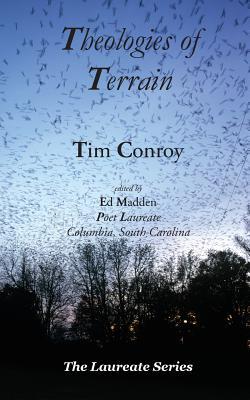Tim Conroy is a theologian of the best kind, a theologian of the ordinary. He knows, as we learn from the rough father in the first poem, that there are no assurances in this life--and there probably isn't another. We face crushing loss and daily difficulties. We have to learn to live the best we can here, now.
For Conroy, truth won't be found in the pews. It will be found in the small blessings of daily coffee in a familiar cafe, or the careful act of rubbing lotion on an old woman's skin, not forgetting the dry spot by her nose. No wonder that there is an ode to a mender here, to one who would mend what is torn, gather and fold what is scattered and tossed, and there are poems for many kinds of caregivers (most of them women), imperfect or ineffective though they may sometimes be.
There are two cathedrals in this book. One is "a cathedral of glances" where someone's always clutching a "pocketbook of judgment." The other is the natural world. "Enter the biome, / wind-swept pilgrim," Conroy writes in "Whispers of Trees," surely a concise revision of Robert Frost's "Directive." Conroy points us to a "cathedral" of trees where we are encouraged to find not truth or healing but perspective--to measure ourselves "by how a towering / moment passes." There's something deeply sacramental here, so it's not surprising that the poem ends with a command that we "absorb the wafer" of this moment. Conroy is part of a long tradition in American poetry, the visionary poet of the ordinary and natural world.
As he says near the end of the book, "I have felt a voice / in the forest of owls and ordinary spaces."
In "Theology of Terrain," Conroy is sure that there is some promise "deep in this land," He wants to find spiritual meaning in the natural world, and he insists that it offers healing and solace, or at least the potential for these things. But the natural world is always overwritten by the human. The horizon is inscribed by memory--especially memories of fathers and brothers. Some of these memories are difficult, he admits, but he urges us to stick with them, to find the truth in them. He also recognizes that the natural world is threatened by the human--not just the critters who learn "the perils of living / with creatures like us" in "Motion Detectors," but the wild geese in "Conventional Wisdom," who (pace Mary Oliver) aren't headed home but are confused by climate change and shitting on our cars.
And we are ourselves imperfect and mortal. While this is obvious, Conroy reminds not to love our neighbor, but to remember "your neighbor is human." Remember that we are all sometimes rescued by strangers, all sometimes saved by love.
There are so many lovely things in this book. There are poems that break me and poems that resonate long after I've turned the page. I am delighted to help bring this beautiful book into the world.
This is a book not of answers but of questions. The book opens asking: will we be all right? Maybe. Maybe not. As Conroy says in one of the best poems in this book, "Marsh Deer," "Lives are as fleeting as bird songs, / as long as letting go." Maybe "will we be all right" is not the right question. Conroy leads us toward the better questions that end this book, not questions about our own survival, but questions about our relationships with one another.
Ed Madden
